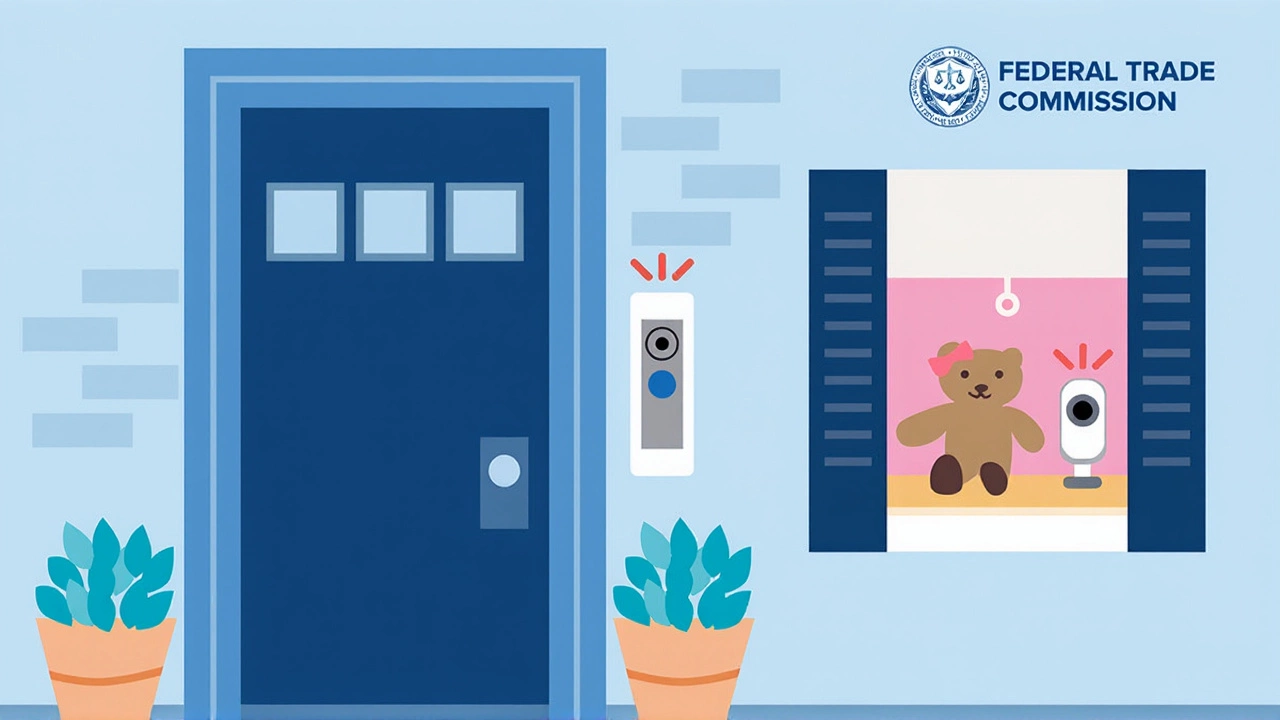When the Federal Trade Commission released its complaint on May 25, 2023, it laid bare a series of privacy violations at Ring LLC, the California‑based home‑security camera firm that Amazon.com Inc. bought in February 2018. The agency alleged that Ring let employees and contractors watch intimate video feeds from bedrooms and bathrooms, and that hackers could hijack accounts to harass children. Samuel Levine, director of the FTC’s Bureau of Consumer Protection, called the conduct "a stark reminder that profit‑over‑privacy doesn’t pay."
Background on Ring and Its Amazon Acquisition
Founded in 2012, Ring rose quickly by advertising its video‑doorbells and indoor cameras as a way to “see your home, away from home.” The company’s promise of "greater home security" attracted millions of households, especially after the 2018 purchase by Amazon, which integrated Ring into its smart‑home ecosystem. California became a hub for Ring’s research labs, yet the rapid scaling outpaced the development of robust security safeguards.
FTC Investigation Findings
The FTC’s probe, sparked by consumer complaints and a whistle‑blower tip, uncovered that Ring employees could access any live or recorded video without a justified reason. One employee admitted to watching thousands of recordings of female users in private spaces over several months before a coworker reported the behavior. Because Ring lacked basic audit logs, the agency could not determine how many other staff members may have abused access.
Beyond internal misuse, the investigation revealed glaring technical gaps: the company did not require multi‑factor authentication (MFA) for customer accounts, leaving them vulnerable to credential‑stuffing and brute‑force attacks. Hackers exploited these loopholes to gain control of cameras, stream footage live, and even send lewd messages to teenagers through two‑way audio.
Impact on Consumers and Children
Families reported terrifying episodes where strangers spoke to children through a Ring camera, or where the device was turned on to livestream a bedroom while the homeowner was away. In one documented case, a hacker live‑streamed a private video for over an hour before the account was disabled. The FTC’s consumer alert, authored by Veda Lowthorp, highlighted that Ring marketed its indoor cameras with images of children’s rooms, creating a false sense of "peace of mind" while the underlying security was woefully inadequate.
Settlement Terms and New Safeguards
Under the proposed settlement, Ring must implement a sweeping privacy and security program that includes:
- Mandatory multi‑factor authentication for all employee and customer accounts.
- Real‑time monitoring and logging of any human review of video footage.
- Independent audits every six months to verify compliance.
- Deletion of all data, models, and algorithms derived from unlawfully reviewed videos.
- A $5.8 million cash payment to affected consumers.
The order also bars Ring from using customer video for algorithm training without explicit, opt‑in consent.
Wider Industry Implications
This enforcement action signals that regulators are cracking down on the "Internet‑of‑Things" (IoT) sector’s complacency about data protection. Experts note that Ring’s case may serve as a precedent for other smart‑home devices—such as video doorbells from Google’s Nest or security cameras from Apple—that collect biometric data. "Companies can’t hide behind the novelty of connected appliances," said cybersecurity analyst Maya Patel of the Digital Rights Center. "Consumers expect their homes to be safe, not a surveillance playground for employees or hackers."
What Comes Next for Ring?
Ring has pledged to roll out the new security features over the next 12 months, with a public dashboard reporting compliance milestones. The FTC will retain jurisdiction to enforce the consent and data‑deletion requirements, and a federal judge must approve the settlement before it takes effect. Meanwhile, consumer advocacy groups are urging lawmakers to draft federal standards for IoT privacy, arguing that voluntary measures have proven insufficient.
Frequently Asked Questions
How does the FTC settlement affect current Ring customers?
All existing Ring users will see multi‑factor authentication added to their accounts within the next year. The company must also provide a clear opt‑in request before any future human review of video footage, and will delete any data previously collected without consent.
What specific security flaws did hackers exploit?
Hackers leveraged the lack of multi‑factor authentication to perform credential‑stuffing attacks, using leaked passwords from other services to gain access. Once inside, they could control cameras, enable two‑way audio, and stream live video without the homeowner’s knowledge.
Why is Ring’s case considered a landmark for IoT privacy?
It is the first time the FTC has required a smart‑home company to delete algorithmic models built on unlawfully obtained video. The settlement also mandates regular third‑party audits, setting a new benchmark for transparency in the connected‑device market.
Will the $5.8 million settlement compensate all victims?
The cash fund is earmarked for consumers who can demonstrate they suffered a privacy breach. While it won’t cover every user, the FTC says the amount reflects the scale of documented harm and will be distributed on a first‑come, first‑served basis.
What steps can consumers take right now to protect their homes?
Experts advise enabling any available two‑factor authentication, changing passwords to unique, strong ones, and regularly reviewing account activity logs. If a Ring device shows signs of tampering, disconnect it from Wi‑Fi and contact customer support immediately.

Hi there, I'm Ethan Kingswood, a sports enthusiast with a particular passion for cycling. I've been involved in the world of sports for over a decade and have gained expertise in various disciplines. My love for cycling has led me to write engaging articles and blog posts about it, sharing my knowledge and experiences with fellow cycling enthusiasts. I also enjoy participating in cycling competitions and training others to improve their skills. My ultimate goal is to inspire more people to embrace the exciting and rewarding world of cycling.